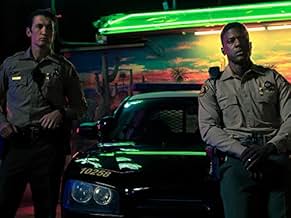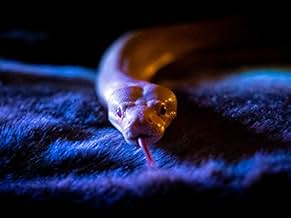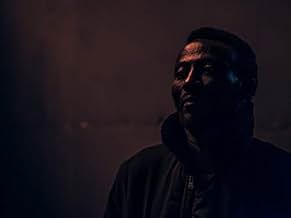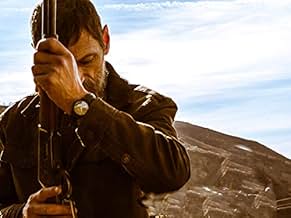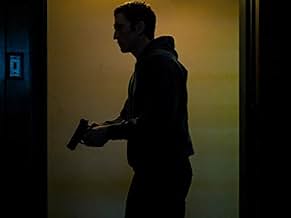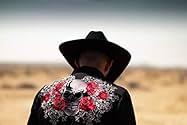Detective Martin Jones, who leads a double life as a killer for hire in Los Angeles' deadly underground, suffers an existential crisis which leads him deeper into a blood splattered world of... Read allDetective Martin Jones, who leads a double life as a killer for hire in Los Angeles' deadly underground, suffers an existential crisis which leads him deeper into a blood splattered world of violence.Detective Martin Jones, who leads a double life as a killer for hire in Los Angeles' deadly underground, suffers an existential crisis which leads him deeper into a blood splattered world of violence.
Browse episodes
Storyline
Did you know
- TriviaWas packaged to the Cannes Film Festival under the title "North of Hollywood, West of Hell."
- GoofsThe show focuses on the Los Angeles County Sheriff's Department. While they do have the ability to make arrests anywhere in the county, they generally do not patrol in the city of Los Angeles (as represented in the story) since it's covered by L.A.P.D. instead. The Sheriff's Department works in unincorporated towns like Altadena and East Los Angeles, incorporated cities that contract with them like Santa Clarita and West Hollywood, and transit agencies like Metrolink and Los Angeles MTA.
Featured review
Created by Nicolas Winding Refn and Ed Brubaker, and directed by Refn, Too Old To Die Young is the definition of "not for everyone". This is Refn sans restrictions, representing the purest yet expression of his aesthetic sensibilities and thematic concerns. If you thought Only God Forgives (2013) was slow, all style and no substance, and pretentiously self-indulgent, then TOTDY is not for you, simple as that. Running for 13 hours across the course of 10 episodes, Refn regards it as "a 13-hour movie" and insists that it is not a television show. Either way, I loved it. The aesthetic is exceptional, the quirks are pure surrealism, the humour is spot on, the violence (particularly the sexual violence) is sudden and barbaric, but never gratuitous or pointless, and the themes are fascinating. This isn't going to turn a single person into a Refn fan. Indeed, it will probably alienate some of his more casual fans, as it tests the limits of what even the most artistically open-minded viewer will watch on their television screens. That said, if you're on-board with it, you're in for an unforgettable ride.
Martin Jones (Miles Teller) and his partner Larry (Lance Gross) are two uniformed LA cops on patrol. After sexually harassing and extorting a young woman because he can, Larry is taking a selfie for his mistress, when Jesus Rojas (an exceptional Augusto Aguilera) shoots him in the back of the head. And from that opening scene springs the story, which introduces us to local crime boss Damian (Babs Olusanmokun), Martin's 18-year-old girlfriend Janey (Nell Tiger Free), her billionaire father Theo (a completely insane William Baldwin), former FBI agent Viggo Larsen (John Hawkes), his associate Diana (Jena Malone), and Yaritza (a stunning, scene-stealing Cristina Rodlo), a young woman with a penchant for sexual domination who claims to be the High Priestess of Death.
If this makes the show sound like a densely plotted neo-noir, then let me put that notion to bed right now - make no mistake, in TOTDY, the plot comes a long way behind such things as tone, imagery, mood, and atmosphere.
The most obvious aesthetic elements are the cinematography by Darius Khondji and Diego García and the editing by Refn's regular cutter, Matthew Newman. The first episode, and several of the later episodes, are bathed in neon, with vibrant reds, purples, oranges, blues, and greens saturating the screen. The second episode then is set in Mexico and is a complete contrast to the first, almost over-exposed, with whites popping and bleeding into any nearby blacks.
Additionally, every shot feels deliberate, meticulously composed, important, like every element of the composition is saying something of significance; for example, whether the camera moves or not offers a commentary on the content of the scene. Every item within the frame feels necessary, intentional, and by design. And scenes go on for a loooooong time; most run at least two beats beyond where the natural end would seem to be, with long silences and languidly-paced, emotionlessly delivered dialogue. This all creates a sense of extreme awkwardness that makes the viewer restless and uncomfortable, which, of course, is precisely the point.
This lethargic sense is helped immensely by the editing, which is almost imperceptible. It feels like the show was edited before it was shot; every cut feels measured, happening where it does because that's the only place it could happen. I'd be shocked to learn that a lot of coverage was shot to be assembled in the editing room later; it's too tight for that. The edit must have been planned out from the get-go. Coupled with this, the sound design by Paul Hackner is unique. For interiors, there is often no ambient room noise and because there are such long pauses in the dialogue, the silence is oppressive. It has the effect of suggesting the characters aren't in the room, making it feel almost ethereal and hypnotic, and it turns conversations that are already slow and full of silence into something even more distinctive.
And what is all of this in service of? What is Refn saying? The main theme is very straightforward - toxic masculinity and the commodification of the female, in particular the sexual commodification. TOTDY is a show wherein many of the female characters are looked upon by men as objects to be used rather than as people with their own agency. In one particular scene, a porn director washes down a young woman with a hose, the way one might wash down a horse after a race. When the show begins, it seems to commit the same sin, as none of the females have much in the way of vibrancy, and all are defined based upon their relationships with men. It's only as the series moves on, and the characters of Diana, Janey, and Yaritza assume centre stage that we realise the method in Refn's madness - despite how it begins, this isn't a show about men. Paedophiles, racists, violent misogynists, amoral murderers, people traffickers, even a father who unashamedly hints at incest - Refn and Brubaker have assembled quite a collective of male bottom feeders to pitch against the female characters. Never has the phrase "the evil that men do" been more appropriate.
Another issue looked at includes the notion that America is a dying empire, unaware of its own imminent demise. When this happens, it will return to what it was born from - violence, and only the few who were prescient to the collapse will be able to protect the weak and the innocent. This is laid out fairly explicitly in an astonishing monologue from Viggo which taps into some of the tenets of post-Darwinian French decadence, whereby industrialisation was often linked to notions of the fin de siècle and the theory that humanity was more likely to devolve than evolve. In TOTDY, Refn presents humanity as at a transitory moment right before a cataclysmic shift. Technology has overtaken morality; civilization has pushed itself to the point of self-consumption; the individual is insignificant. Viggo thinks about this in terms of society fracturing and collapsing, with humanity no longer at the centre, no longer a part of nature. Diana thinks of it in social and political terms, with the privileged few coming to rule over the many. Jesus thinks about it in more biblical terms where he is an Old Testament-style God punishing those who have wronged him.
All in all, I loved the show. But there's no denying that the very things which some people embrace and celebrate (particularly the pace), will drive others up the wall. And certainly, it's not hard to imagine a hell of a lot of people watching for 20 minutes before hastily changing the channel and deeming the whole enterprise the "worst show ever." Amazon has allowed Refn to indulge in everything that his detractors criticise and his fans laud, and the result is either a travesty or masterpiece, depending on your perspective.
Martin Jones (Miles Teller) and his partner Larry (Lance Gross) are two uniformed LA cops on patrol. After sexually harassing and extorting a young woman because he can, Larry is taking a selfie for his mistress, when Jesus Rojas (an exceptional Augusto Aguilera) shoots him in the back of the head. And from that opening scene springs the story, which introduces us to local crime boss Damian (Babs Olusanmokun), Martin's 18-year-old girlfriend Janey (Nell Tiger Free), her billionaire father Theo (a completely insane William Baldwin), former FBI agent Viggo Larsen (John Hawkes), his associate Diana (Jena Malone), and Yaritza (a stunning, scene-stealing Cristina Rodlo), a young woman with a penchant for sexual domination who claims to be the High Priestess of Death.
If this makes the show sound like a densely plotted neo-noir, then let me put that notion to bed right now - make no mistake, in TOTDY, the plot comes a long way behind such things as tone, imagery, mood, and atmosphere.
The most obvious aesthetic elements are the cinematography by Darius Khondji and Diego García and the editing by Refn's regular cutter, Matthew Newman. The first episode, and several of the later episodes, are bathed in neon, with vibrant reds, purples, oranges, blues, and greens saturating the screen. The second episode then is set in Mexico and is a complete contrast to the first, almost over-exposed, with whites popping and bleeding into any nearby blacks.
Additionally, every shot feels deliberate, meticulously composed, important, like every element of the composition is saying something of significance; for example, whether the camera moves or not offers a commentary on the content of the scene. Every item within the frame feels necessary, intentional, and by design. And scenes go on for a loooooong time; most run at least two beats beyond where the natural end would seem to be, with long silences and languidly-paced, emotionlessly delivered dialogue. This all creates a sense of extreme awkwardness that makes the viewer restless and uncomfortable, which, of course, is precisely the point.
This lethargic sense is helped immensely by the editing, which is almost imperceptible. It feels like the show was edited before it was shot; every cut feels measured, happening where it does because that's the only place it could happen. I'd be shocked to learn that a lot of coverage was shot to be assembled in the editing room later; it's too tight for that. The edit must have been planned out from the get-go. Coupled with this, the sound design by Paul Hackner is unique. For interiors, there is often no ambient room noise and because there are such long pauses in the dialogue, the silence is oppressive. It has the effect of suggesting the characters aren't in the room, making it feel almost ethereal and hypnotic, and it turns conversations that are already slow and full of silence into something even more distinctive.
And what is all of this in service of? What is Refn saying? The main theme is very straightforward - toxic masculinity and the commodification of the female, in particular the sexual commodification. TOTDY is a show wherein many of the female characters are looked upon by men as objects to be used rather than as people with their own agency. In one particular scene, a porn director washes down a young woman with a hose, the way one might wash down a horse after a race. When the show begins, it seems to commit the same sin, as none of the females have much in the way of vibrancy, and all are defined based upon their relationships with men. It's only as the series moves on, and the characters of Diana, Janey, and Yaritza assume centre stage that we realise the method in Refn's madness - despite how it begins, this isn't a show about men. Paedophiles, racists, violent misogynists, amoral murderers, people traffickers, even a father who unashamedly hints at incest - Refn and Brubaker have assembled quite a collective of male bottom feeders to pitch against the female characters. Never has the phrase "the evil that men do" been more appropriate.
Another issue looked at includes the notion that America is a dying empire, unaware of its own imminent demise. When this happens, it will return to what it was born from - violence, and only the few who were prescient to the collapse will be able to protect the weak and the innocent. This is laid out fairly explicitly in an astonishing monologue from Viggo which taps into some of the tenets of post-Darwinian French decadence, whereby industrialisation was often linked to notions of the fin de siècle and the theory that humanity was more likely to devolve than evolve. In TOTDY, Refn presents humanity as at a transitory moment right before a cataclysmic shift. Technology has overtaken morality; civilization has pushed itself to the point of self-consumption; the individual is insignificant. Viggo thinks about this in terms of society fracturing and collapsing, with humanity no longer at the centre, no longer a part of nature. Diana thinks of it in social and political terms, with the privileged few coming to rule over the many. Jesus thinks about it in more biblical terms where he is an Old Testament-style God punishing those who have wronged him.
All in all, I loved the show. But there's no denying that the very things which some people embrace and celebrate (particularly the pace), will drive others up the wall. And certainly, it's not hard to imagine a hell of a lot of people watching for 20 minutes before hastily changing the channel and deeming the whole enterprise the "worst show ever." Amazon has allowed Refn to indulge in everything that his detractors criticise and his fans laud, and the result is either a travesty or masterpiece, depending on your perspective.
Details
- Release date
- Country of origin
- Official sites
- Language
- Also known as
- Занадто старий, щоб померти молодим
- Production company
- See more company credits at IMDbPro
- Runtime1 hour 16 minutes
- Color
- Sound mix
- Aspect ratio
- 1.85 : 1
Contribute to this page
Suggest an edit or add missing content





